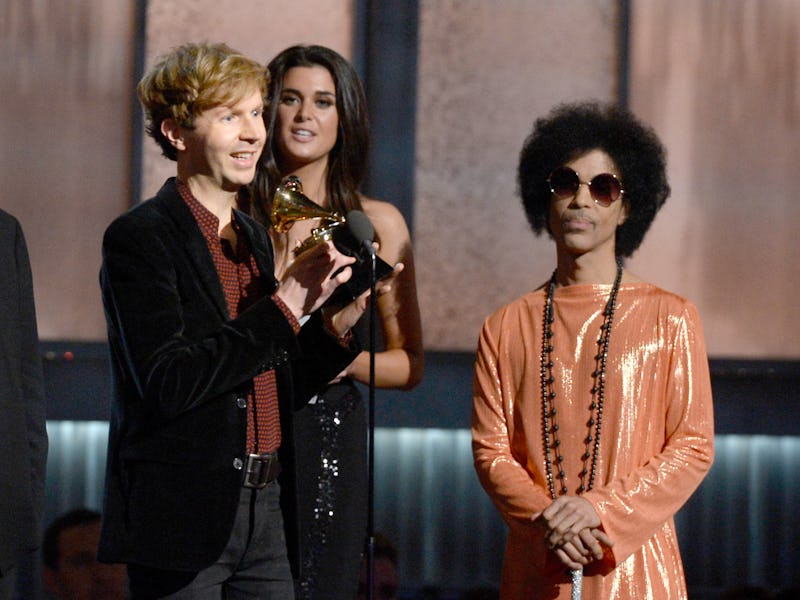The Musicians Who Couldn't Exist Without Prince
The king of Paisley Park was arguably more copied than any other artist of the past 30 years.

It doesn’t take poring over the social media outbursts from artists from all walks of music to know that the dearly beloved, now dearly departed Prince is beyond-cherished and influential. But it’s truly staggering to read these, and think about everything that Prince is directly responsible for in popular music — over the past two-and-a-half decades, at least.
You could look at it multiple ways: His unfettered, fluid sexuality, articulated uncompromisingly in his songs, has been much commented upon. But of course, there’s also his ability to create a fluctuating “sound” which fits into exactly no other genre.
To describe Prince’s music as “funky” doesn’t mean it’s “funk,” exactly. It’s crossed with so many gestures from other strains of electronic music; complexly chorded, post-Beatles “baroque” pop; hip-hop; jazz; prog…the list goes on.
All of these styles and more, as he drew into his distinct, brittle, skin-tight, sometimes outright demented sonic universe. Prince’s music looked both forward and backwards at all times without sounding patchy or contrived. A Prince record was unmistakable not just because of the breathy seductiveness of his voice — and his impossible-to-emulate screams — but because of his prodigious guitar playing, the synth and drum sounds he favored, the mellow yet jagged quality of his mixes.
From the vast possibilities Prince’s music introduced to the pop music sphere — and art, in general — was born the sound of countless artists, as well as their approach to building a career. We’d like to recall a few treasures and other phenomena we wouldn’t have, in their consummate form, without the Paisley Park master.
D’Angelo
I was five years old. “I Wanna Be Your Lover” had just come out, and it was a big hit. When that album came out, it was just huge. He really, literally, was the talk of the town. Everybody was wondering, “Who is this guy? Is he a guy? Is it a girl?” No one really knew who it was…They told me, “He plays everything, he writes everything, he’s singing everything,” so I was hooked from then on. I learned how to play every song on that album, note for note, at five years old.
This, D’Angelo claims, was his first memory of Prince. And if you listen to anything the perfectionistic, reclusive singer/songwriter/bandleader has ever recorded, you can tell that Prince-ness has been in his bones essentially since he heard music for the first time. It’s just too deep-seated.
From his guitar to his falsetto vocals to his melting pot of influence to his studio-rat obsessiveness, D’Angelo willingly admits that he wouldn’t exist, in many ways, without Prince’s guiding light. He bonded with Questlove, his most important champion and collaborator, over Prince. Later, Prince himself would introduce D’Angelo to Joni Mitchell, a huge influence on both artists. On his albums, he’s attempted to play almost every instrument (Prince did so, largely, from his first LP on) and exert the same level of rigid, label-independent control over all of his records. He’s covered Prince (see below). The closest experience one can get to Prince live, is probably seeing D’Angelo and his band — Prince and the Revolution? D’Angelo and the Vanguard? Not a coincidence, by any stretch of the imagination.
Outkast/Andre 3000
Sure, you can see Prince in Andre 3000’s inimitable, larger-than-life fashion sense, but he’s even more apparent in Outkast’s consistent genre-flouting and commitment to major stylistic shifts with every album it releases. When Andre 3000 made The Love Below, specifically, he hit on a unique blend of songwriting, speak-song funk, and warped but sensual R&B that took Prince as its primary source material. Big Boi’s solo career, though more directly hip-hop-tinged, is steeped in similar styles. They even made their own music film, with its echoes of Under the Cherry Moon. To conclude, a Big Boi song sampling Prince’s drums (from “Automatic”):
Beck
Is Beck’s career-long insistence on donning different stylistic hats, and maintaining his fan base across all of it, more Bowie’s legacy or Prince’s? When you look at the stylistic particulars, Beck’s electro-acoustic-funk bromides — his central legacy — have a lot more to do with the latter, in spirit. It’s designed as dance music and soul in its least expected, most daring form. And this isn’t even counting an album which stands as one of the greatest implicit Prince tribute projects of all time — and in this author’s opinion, Beck’s finest work by far — 1999’s (coincidence?) deadly funky, insanely ambitious party album Midnite Vultures. (If you want to, you can watch Beck covering “1999” just a few years ago.)
Pharrell
This is not just about his solo work, though it often outright apes Prince (and have you heard the man sing?). It’s about the way the Neptunes’ production style took the hip-hop/funk possibilities Prince introduced on albums like Sign o’ the Times and The Black Album and ran with them — the way in which Pharrell’s production crossed over so easily into many spheres, from the Top 40 to the Re-Up Gang. The thin, taut funk and odd electro-acoustic blends Pharrell has concocted over his career are in the direct lineage of Prince.
The Weeknd
There are shapeshifting, edgy, retro-tinged modern pop stars by the pound. And especially with the current drift toward ‘80s-like sound, Prince is everywhere. But the Weeknd’s sexual frankness, singing style, and particular creeping, sometimes neo-funky style of songwriting emulates the Prince template directly. He’ll be the first to admit it.
MGMT and a million other indie electro-pop bros
Imagining everything that might not have been possible in a world without Prince is, frankly, vertigo-inducing.
Rest in peace, Purple One.